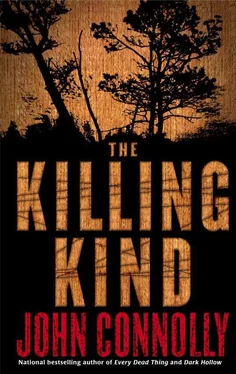“Policemen?”
Her eyes narrowed. “Perhaps. Yes, almost certainly one or two policemen. It sometimes uses them to cover its tracks, or to stay in touch with any legal moves against it. But its primary instrument is a man, a thin man with red hair and a fondness for predation. Sometimes he has a woman with him, a mute.”
“That's him,” I said. “That's Pudd.”
For the first time since we had begun to talk of the Fellowship, Amy reached out to her husband. Her hand found his and gripped it tightly, as if even the mention of Pudd's name might invoke his presence and force them to face him together.
“He goes by different names,” she continued, after a pause. “I've heard him referred to as Ed Monker, as Walter Zaren, as Eric Dumah. I think he was Ted Bune once, and Alex Tchort for a time. I'm sure there were others.”
“You seem to know a lot about him.”
“We're religious, but we're not naive. These are dangerous people. It pays to know about them. Do those names mean anything to you at all?”
“I don't think so.”
“Do you know anything about demonology?”
“Sorry, I canceled my subscription to Amateur Demonologist. It was scaring the mailman.”
Doug permitted himself the ghost of a smile. “Tchort is the Russian Satan, also known as the Black God,” he said. “Bune is a three-headed demon who moves bodies from one grave to another. Dumah is the angel of the silence of death, and Zaren is the demon of the sixth hour, the avenging genius. Monker is the name he uses most frequently. It seems to have a particular resonance for him.”
“And Monker is a demon as well?”
“A very particular demon, one of a pair. Monker and Nakir are Islamic demons.”
A picture flashed in my mind: Pudd's fingers gentling brushing the mute's cheek and softly whispering.
My Nakir.
“He called the woman his Nakir,” I told them.
“Monker and Nakir examine and judge the dead, then assign them to heaven or hell. Your Mr. Pudd, or whatever you wish to call him, seems to find the demonic associations funny. It's a joke.”
“It seems like kind of specialized humor,” I said. “I can't see him making it onto Letterman.”
“The name Pudd has a particular meaning for him as well,” said Doug. “We found it on an arachnology web site. Elias Pudd was a pioneer in the field of American arachnology, a follower of Emerton and McCook. He published his most famous work, A Natural History of the Arachnid, in 1933. His speciality was recluses.”
“Spiders.” I shook my head. “They say people start to look like their pets, in time.”
“Or they pick the pet they most resemble,” answered Doug.
“You've seen him, then.”
He nodded. “He came out here once, he and the woman. They parked over by the chicken coops and waited for us to come out. As soon as we did, Pudd threw a sack from the car, then backed up and drove away. We never saw them again.”
“Do I want to know what was in the sack?”
Amy answered. “Rabbits.” She was looking at the floor so I couldn't see the expression on her face.
“Yours?”
“We used to keep them in a hutch out by the coops. One morning we came out and they were just gone. There was no blood, no fur, nothing to suggest that they'd been taken by a predator. Then, two days later, Pudd came and dumped the sack. When we opened it, it was filled with the remains of the rabbits. Something had bitten them. They were covered in gray brown lesions, and the flesh had begun to rot. We took one to the local vet, and he told us they were recluse bites. That's how we discovered the significance of the name Pudd for him.
“He was warning us to stay out of his business. We had been making inquiries about the Fellowship. We stopped after the visit.”
She raised her face and there was no indication of how she felt, apart from a slight tension around her mouth.
“Is there anything more that you can tell me?”
“Rumors, that's all,” said Doug, raising the water bottle to his lips.
“Rumors about a book?”
The bottle paused before it reached his mouth, and Amy's grip tightened on his hand.
“They're recording names, aren't they?” I continued. “Is that what Pudd is-some kind of infernal recording angel, writing down the names of the damned in a big black book?”
They didn't reply, and the silence was suddenly broken by the sound of the men filing into the house for their midmorning break. Doug and Amy both stood, then Doug shook my hand once again and left to make arrangements for the meal. Amy guided me away from the dining room and walked me to my car.
“As Doug said, the book is just a rumor,” she told me, “and the truth about the Fellowship still remains largely hidden. Nobody has yet managed to link its public face with its other activities.”
Amy took a deep breath, steeling herself for what she had to say next.
“There is something else I should tell you,” she began. “You're not the first to have come here asking about the Fellowship. Some years ago, another man came, from New York. We didn't know as much about the Fellowship then, and we told him less than we knew, but it still provoked the warning. He moved on, and we never heard of him again… until two years ago.”
The world around me faded into shadow, and the sun disappeared. When I looked up, I saw black shapes in the sky, descending in spirals, the beating of their wings filling the morning air and blocking out the light. Amy's hand reached out to take mine but all of my attention was focused on the sky, where the dark angels now hovered. Then one of them drew closer and his features, which had previously only been a chiaroscuro of light and shade, grew clear.
And I knew his face.
“It was him,” whispered Amy, and the dark angel smiled at me from above, his teeth filed to points, his huge wings feathered with night; a killer of men, women, and children now transformed by his passage into the next world.
“It was the Traveling Man.”
I sat on the hood of my car until the sickness had passed. I recalled a conversation in New Orleans some months after Susan and Jennifer had died, a voice telling me of its belief that somehow, the worst killers could find one another and sometimes connect, that they were sensitized to the presence of their own kind.
He would have found them. His nature, and his background in law enforcement, would have ensured it. If he came hunting for the Fellowship, then he would have tracked them down.
And he would have let them live, because they were his own kind. I remembered again his obscure biblical references, his interest in the Apocrypha, his belief that he was some kind of fallen angel sent to judge humanity, all of whom he found wanting.
Yes, he had found them, and they had helped to fan his own flame into being.
Amy reached out and took both of my hands in her own.
“It was seven or eight years ago,” she said. “It didn't seem important, until now.”
I nodded.
“You're going to continue looking for these people?”
“I have to, especially now.”
“Can I say something to you, something you may not want to hear?”
Her face was grave. I nodded.
“In all that you have done, in all that you have told me, it seems that you have been intent on helping the dead as much as the living. But our first duty is to the living, Charlie, to ourselves and those around us. The dead don't need your help.”
I paused before replying. “I'm not sure I believe that, Amy.”
For the first time, I saw doubt appear in her face. “You can't live in both worlds,” she said, and her voice was hesitant. “You must choose. Do you still feel the deaths of Susan and Jennifer pulling you back?”
Читать дальше












